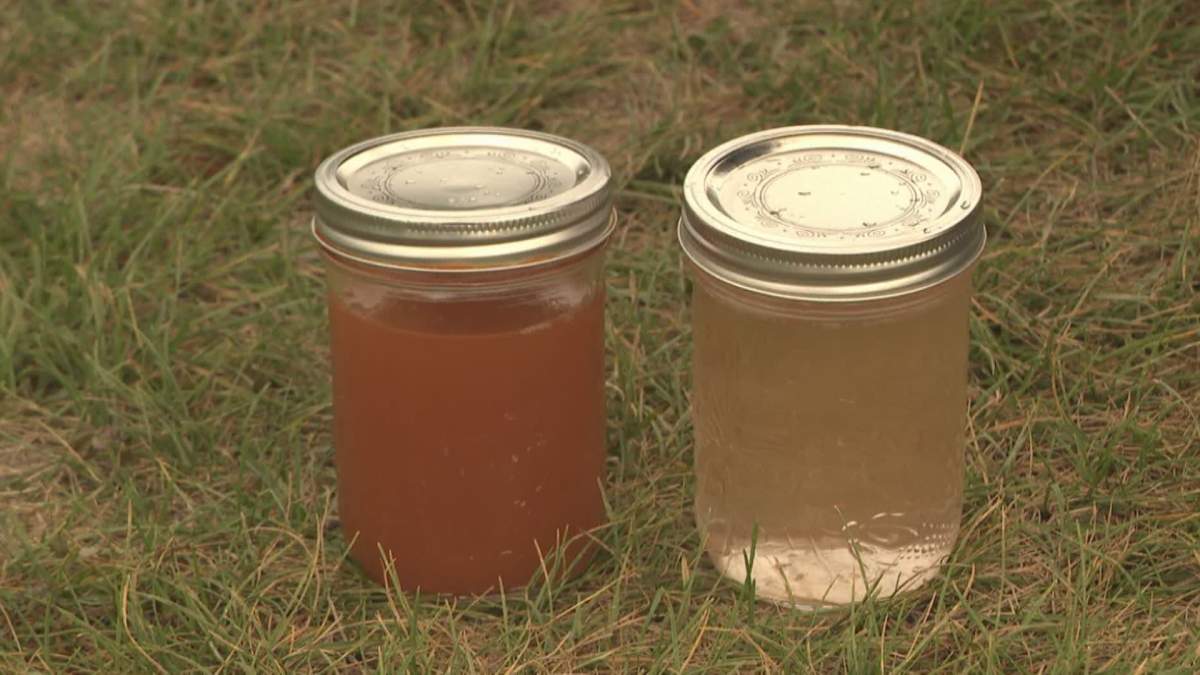A plastic bottle crinkles in Deanna Starlight’s hand. She holds it up while standing in her home in Tsuut’ina Nation.

“We normally have porridge every day,” she said. “One of these (bottles of water) takes a porridge.”
Bottled water has become a life source for the family; they even use it to cook with. Starlight estimates they spend up to $800 a month on bottled water, either in big plastic jugs or little bottles like the one she has in her hand.
“At one point there was 22 of us, you know, downstairs another family down there and here. A lot of water, a lot of water,” said Starlight, who is an elder in the community.

The Starlights get their water from a well. Five years ago they had their water tested and there were a number of elements above the guidelines, including barium, aluminum and even traces of lead.
“I don’t trust it. I don’t trust that water,” said Bruce Starlight, Deanna’s husband.
According to Health Canada, “adverse effects on the kidneys have shown the strongest association with chronic oral exposure to barium.”
But a toxicologist from the University of Saskatchewan said the levels would have to be much higher than what was found in Starlight’s water for severe health problems to occur.

Get breaking National news
“The barium (found in the Starlight’s water), which is about double the guideline, it does interfere with elements like potassium, which ultimately could affect the heart, but again, I think it’s a minimal problem. I don’t think it would have significant health implications,” said Dr. Barry Blakley with the University of Saskatchewan.
“Iron, which was in this water, was well above the standard probably 100-fold or more — that one is not a toxicology issue, it’s just taste and aesthetics. Drinking that type of water wouldn’t be pleasant.
“The fact that there are a number of elements above the guidelines should be looked at and to really evaluate that you have to look at the people who are drinking the water, younger children, pregnant woman.”
Bruce’s sister Veera lives next door. At times her water is bright orange with iron and she said it stains her tub and wears down her appliances and smells awful.
“We have to run our water for probably about 40 minutes until it runs clear,” she said. “It’s frustrating, we’ve been complaining, but nothing has happened.”
Veera is constantly worried about the effects the water could be having on her family’s health. She said the children get sores on their bodies every time they take a bath. Veera said her water was tested a couple of years ago but she never got the results.
An 18-month long national investigation by a consortium of journalists and students, including Global News, APTN and Mount Royal University, led by Concordia University’s Institute for Investigative Journalism has found First Nations are still battling huge problems in providing access to clean drinking water to residents. This is despite the Trudeau government’s firm commitment and huge investments to improve the water quality in Indigenous communities.
In 2019, Tsuut’ina Nation built a new water treatment facility but according to the plant operator 60 per cent of people are still living without safe drinking water.
“In Tsuut’ina specifically, there are some areas and a few homes with wells where the groundwater has naturally occurring elevated levels of barium. ISC continues to work with the nation to address the issue and ensure that the water in the Nation is safe,” Leslie Michelson with Indigenous Services Canada said in a statement to Global News.
In 2014, four Alberta First Nations, including Tsuut’ina, filed litigation against the federal government alleging it failed to provide safe drinking water to its communities. All parties agreed to a stay of litigation until January of 2021, which is now expired. The government said it’s looking to extend the stay to continue “exploratory discussions.”
Until they see something different streaming out of their taps, the Starlights will continue to buy their water.
With files from:
University of King’s College
Lyndsay Armstrong
Mount Royal University
Noel Harper, Christian Kindrachuk, Georgia Longphee, Kiah Lucero, Andrea Wong, Karina Zapata (Instructor: Janice Paskey)
See the full list of “Broken Promises” series credits and more information about the consortium here. Produced by the Institute for Investigative Journalism, Concordia University. For tips on this story, please contact the reporters at: iij.tips(at)protonmail.com.








Comments